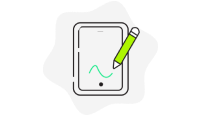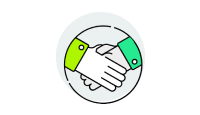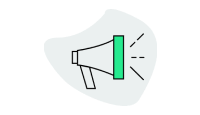Artificial Intelligence for Global Health Challenge
+400 Points
Hey there, future change-makers! Dive into the world of AI and tackle some of the biggest health challenges our planet faces. From combating infectious diseases to improving healthcare access, your innovative ideas can truly make a difference. Imagine a world where everyone gets the healthcare they need regardless of where they live. That's our goal, and AI is our tool for change.
You're here to do more than learn; you're here to invent. Join the Patrick J. McGovern Foundation, and other organizations, as you dream up a groundbreaking product, an impressive business strategy, or a captivating marketing campaign that could transform health with AI for people everywhere. Let's get those mental wheels turning and work towards a healthier, more inclusive future. Ready, set, innovate! Win big $$$!
You’ll address the Challenge question: How can AI be used to save lives and improve global health outcomes?
This challenge will be open from July 1st - Aug 9th.


Skills you'll develop
- Problem Solving
- Communication
- Social Awareness
Explore the Issue
Congratulations on taking the first step to solve this Challenge -- becoming an expert on the topic! Pick and choose from all of the resources in this section to learn about the topic. Watch the video to learn more about this phase. Note that NAF has recommended all of the videos and other resources in the Challenge.
⏱️Time: 2- 4 Hours (Week 1 of the Challenge)
✏️Use the optional KNOtebook to record notes and questions
💼Mentor: Ask a mentor questions about the topic
🎯Future-Ready Skills: Social Awareness, Initiative and Self-Direction
Build Background Knowledge
Before we jump into the world of Artificial Intelligence (AI) in global health, let's talk about what global health is and why it's super important. We'll explore how health affects people worldwide, from dealing with diseases to promoting wellness, and why paying attention to it matters. So, get ready, because we're about to discover some really interesting facts about how health connects us all!
Challenges in Global Health Today
In our world today, there are big health problems that affect many people all over the world. These problems include diseases like sickle cell, diabetes, TB, HIV, cancer, Alzheimer's, heart attacks, strokes, and problems with mothers and babies. Maybe someone you know has experienced one of these diseases, like a family member or friend getting sick with cancer or diabetes.
The 3 Main Challenges in Global Health Today (4:10)
Examining the Impact on Communities Worldwide
It's tough to watch our loved ones struggle with health challenges. But what if technology could help lessen the impact of these diseases or even find cures one day? That's where AI steps in! In this video, we'll delve into how AI tackles these major health issues, aiming to improve health equity and make a difference in people's lives.
Global Health Challenges (3:44)
Diseases that Changed Humanity Forever
Throughout history, we've faced many invisible enemies that have caused serious harm and even death. Even though we've made progress in fighting some diseases, new ones keep popping up. Whether it's illnesses from way back when people were nomads or more recent pandemics like the Black Plague, this video shows how diseases have changed over time. It reminds us why it's so important for everyone to have access to treatments that can help.
The Diseases that Changed Humanity Forever (5:44)
Interactive Map
Interactive Map Instructions:
Explore Disease Daily's interactive map.
Zoom in, click dots for disease details.
Notice patterns globally.
This map comes from The Disease Daily Organization. The Disease Daily is made by doctors, vets, and public health experts who think everyone should understand infectious disease news. It gets real-time reports from HealthMap about disease outbreaks worldwide.

INTRO TO AI FOR HEALTHCARE
AI in healthcare has been a hot topic of conversation for the last couple of years and it is getting even more notice right now! Doctors and scientists are using it to tackle tough health problems. AI makes healthcare better and easier for everyone.
McGovern wants us to use AI responsibly. They're teaching us how to understand and use AI tech the right way, so we can help people in a good and ethical manner.
Jo Aggarwal
Jo Aggarwal started Wysa, a super smart chatbot for mental health, used by 6 million people in almost 100 countries. In an interview, she shared how her dad's journey from a humble background to leading the Indian postal service inspired her to help others. He encouraged her and her sister to lift people out of poverty in India. Her sister works in diabetes care, and Aggarwal chose mental health, creating Wysa. It's so cool that Wysa got an AI Award from the UK's National Health Service and the FDA thinks it's a breakthrough device! https://www.wysa.com/

Noémie Elhadad
Noémie Elhadad is not just a professor but also leads the department of biomedical informatics at Columbia University. She's doing some amazing stuff in women's health, like creating smart computer models that analyze patient data and even reducing paperwork for doctors! Plus, she's the head of Even, a cool research project at Columbia all about using data to improve women's health.

Pushmeet Kohli
Pushmeet Kohli is the brain behind the science program at Google DeepMind, where they use AI for all sorts of cool stuff, like understanding genes and even predicting how molecules will behave! He's also making sure AI stays safe, with projects like SynthID that protect against fake images. Plus, his team at DeepMind created AlphaFold, a super smart tool for predicting how proteins are shaped. Before DeepMind, he spent a decade at Microsoft leading research on how computers understand things. https://deepmind.google/

AI in Health Care
AI stands for artificial intelligence, which means computer systems that can do smart stuff like humans. Generative AI is even cooler - it can make new things like writing stories or coming up with ideas. It's like a super smart computer that can create new stuff, making tech even more amazing!
AI For Health Program (2:30)
AI for Health
AI is changing healthcare by helping with diabetes and heart problems. It's also making eye disease detection faster, which helps patients. Stanford's RAISE project makes sure AI is used responsibly in healthcare to help everyone. In addition to other companies looking at the opportunities that AI provides making healthcare more accessible.
AI Application in Healthcare (4:21)
AI for Good (:59)
Google Health (1:32)
AI Can Help Save Lives in Hospitals (7:06)
Some Current Uses & Benefits of AI in Healthcare
Definition of Tuberculosis
Tuberculosis (TB) is an infectious disease caused by bacteria that can affect various parts of the body, most commonly the lungs. It's a significant global health issue, with high rates of TB found in countries such as India, China, Indonesia, the Philippines, Pakistan, Nigeria, Bangladesh, and South Africa.
Diagnosis of TB
Artificial intelligence plays a vital role in efficient disease diagnosis, exemplified by its application in TB detection.
Quick Scan: AI can look at medical pictures (like X-rays) really fast.
Super Helper: It helps doctors understand these pictures better, making it easier for them to spot signs of TB quickly.
Making Things Faster: AI speeds up the process, so doctors can find TB cases faster and start helping people sooner.
Helping More People: Because it works so fast, AI can help many people, especially in places where TB is a big problem, making a real difference in their health.
AI Based System holds potential in TB Detection (2:03)
Diagnosis of Covid-19 (5:26)
AI is already playing a role in the prediction and diagnosis of COVID-19
Algorithms: that identify patterns and anomalies are already working to detect and predict the spread of COVID-19,
Image recognition systems: are speeding up medical diagnosis.
AI is also furthering COVID-19 research in three major areas: binary diagnosis (whether COVID-19 is present or absent), studying lung abnormalities, and distinguishing COVID-19 from non-COVID-19 pneumonias.
Using AI to Track Covid (5:26)
Empowering Communities with Personalized Medicine
Technology helps communities and doctors work together to make people healthier, this is why AI can be such a valuable tool in medicine.
AI looks at information about patients to make treatment plans that are just right for them.
Doctors use AI to figure out how much medicine each person needs and the best way to treat them.
AI looks at lots of information from many patients to find out what treatments work best.
This means doctors can give treatments that fit each person's body and health needs.
AI in Medicine: Possible Applications and Potentials (1:50)
Transcribing
Picture this: You're at the doctor's office, chatting about your health. Instead of jotting down everything the doctor says by hand, which can be slow and not always perfect, AI can listen in and quickly turn it into written notes. This helps the doctor keep better records and saves time, so they can focus on helping you feel better. And if someone has trouble hearing or understanding, the AI makes sure nothing gets missed. It's like having a super-fast, super-accurate secretary for the doctor!
Some folks wonder if AI might someday replace doctors, there are concerns about biases and errors and a need between AI and human intuition in healthcare.
While AI like chat GPT4 is great at summarizing patient visits, there's still debate about using it to make medical decisions.
Microsoft VP on Future of AI and Medicine (8:47)
Drug Discovery
AI helps in designing drugs by predicting potential side effects and identifying candidates for clinical trials.
It speeds up research processes, reducing the time and cost of bringing new drugs to market.
The 10 Biggest Trends Revolutionizing Healthcare in 2024 (3:50)
What's the Problem & What Are some Example Solutions
Big health problems around the world, like Asthma, Diabetes, and AIDS, can really affect communities, especially those that already have a hard time. These diseases are more common where people can't easily go to the doctor. Also, not everyone gets the same help from doctors, which makes health issues even worse for some people. To fix these big problems, we need solutions that focus on helping the people who are most affected, taking into account their own situations and what they need.
Healthcare For All
Disparities exist globally, with many facing barriers to essential services due to economic, social, or geographic factors.
Health Disparity
Economic factors, like how much money people have and if they have jobs, affect if they can afford healthcare or medicines they need. Social things, such as education and cultural beliefs, also matter because they can influence how much people know about health and if they seek medical help.
What is a health disparity? (3:11)
Exploring Health Care Disparities
Where people live, like in cities or far away places, can also make it hard for some to get to hospitals. Some places have different healthcare rules, and not everyone has equal access to technology, making it important to work on these issues for fair and better healthcare for everyone.
Exploring health care disparities in minority populations (4:38)
Health Equity
Everyone's health is affected by where they live, what they have access to, and the community around them. Health Equity means making sure everyone has the same chances to be healthy by working together to fix big problems in different areas and creating fair and healthy communities.
Health Equity (4:14)
AI Is Revolutionizing Healthcare
Tech Issues- Potential Problems & Solutions
Tech, like AI, is cool but comes with challenges. Like keeping our info safe (data privacy), unfair decisions AI can make (biases), and making sure everyone can use tech equally (digital divide). How can tech sometimes be unfair without meaning to?
The Power of AI Digital Twins in Healthcare
A digital twin has been training on all your medical history, your genome, and knows how your body is going to react. It can be your advocate.
The Power of AI Digital Twins in Healthcare (:39)
AI in Healthcare: More Transparency
AI is increasingly integrated into healthcare, assisting with note-taking, diagnoses, and more, but due to potential errors, the Biden Administration is proposing a new labeling system, akin to a nutrition label, for AI applications in medicine to provide transparency and help clinicians avoid mistakes.
AI in Healthcare: More Transparency (5:38)
How is AI Solving Real Problems?
Now, let's check out cool ways tech, like AI, helps solve real problems. Remember those AI healthcare solutions? Let's brainstorm how to use them to fight diseases. Get ready to think big and dream up awesome ideas!
How AI Will Change Our World in 2024 (7:20)
How might these be used in health care?
Custom ChatGPTS
more conversational AI
Google Gemini
AI wearables (projections instead of screens)
More AI in our phones
How AI Will Change Our World in 2024 (7:20)
Next Steps
Mentor Moment: Ask Questions!
Did you know that there are professionals, who created the Challenge, standing by to help you? They will also be judging your final pitches, so be sure to take advantage throughout the Challenge and post your questions on your dashboard. They want you to win!
What are you curious about? Ask them any questions that came up for you during the Explore phase.
Three Approaches: Your Choice!
One important part of The KnoPro Challenges is choosing the type of solution you plan to create (in a group or solo) and ultimately pitch to the judges. Check out an example of each of your choices: a product idea, a new business concept, or a marketing campaign. You can also get inspiration from all the winning projects.
Flip the cards to help you decide which approach you may want to take. Later in the Challenge, you'll choose ONE approach.

Product Idea
Product Idea
Get creative and come up with a new product idea that addresses the problem. This might be an app, a game, or a consumer product, for example. The possibilities are endless! You’ll write a design brief to plan your product, and ultimately create a “prototype” to pitch to the judges.
Business Concept
Business Concept
Imagine a unique business idea that addresses the problem. This might be a for-profit or non-profit venture, an online platform, or an in-person experience/pop-up shop, for example. The possibilities are limitless! Write a business plan, and then create a fun way to share your business idea with the judges.
Marketing Campaign
Marketing Campaign
Design an exciting and catchy marketing campaign that addresses the problem and inspires people to act! The campaign might be a viral social media video, a series of emails, or a live event, for example. You’ll write up a marketing plan and then create some "assets" and pitch your idea to the judges.



